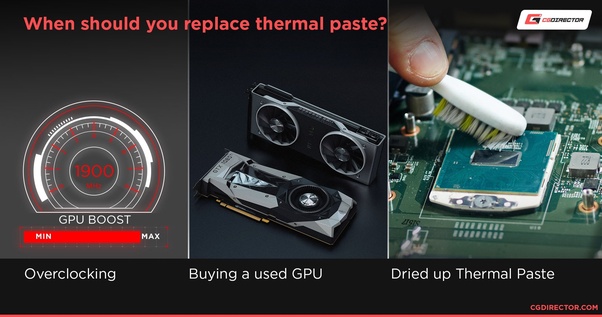Yes, 80 degrees Celsius is hot for a GPU and can potentially lead to overheating issues. When a GPU reaches this temperature, it can impact performance and longevity.
Gamers and PC enthusiasts often monitor GPU temperature to ensure optimal functioning. An 80 degrees Celsius reading might indicate inadequate cooling or high processing demands. Overheating can cause system crashes, reduced performance, and damage to the GPU components. Proper cooling systems, regular maintenance, and monitoring are essential for keeping the GPU within safe temperature ranges.
Understanding the impact of temperature on GPU performance is crucial for optimizing gaming experiences and hardware lifespan. By taking proactive measures to manage temperatures, users can prevent potential hardware issues and enjoy smooth gameplay.

Credit: www.reddit.com
Understanding Gpu Temperature
GPU temperature is an important factor to consider for optimal performance. While 80 degrees Celsius may seem hot for a GPU, it falls within the acceptable range for most graphics cards. Monitoring and maintaining a safe temperature is crucial to prevent overheating and potential damage to your GPU.
Understanding GPU Temperature What is considered a hot temperature for a GPU? When it comes to understanding GPU temperature, it is essential to know what is considered a hot temperature for a GPU. What is considered a hot temperature for a GPU? What is considered a hot temperature for a GPU? When it comes to GPU temperature, it’s crucial to understand what is considered a hot temperature for a GPU. The graphic processing unit (GPU) is a critical component of a computer, especially for gaming or graphic-intensive tasks. Ensuring that the GPU operates within an optimal temperature range is essential for its performance and lifespan. But what exactly is considered a hot temperature for a GPU? When it comes to a GPU, temperatures above 80 degrees Celsius can be considered hot. At this temperature, the GPU may start to experience performance issues, and prolonged exposure to such heat can potentially lead to hardware damage. To prevent overheating, it’s recommended to monitor the GPU temperature regularly and ensure proper cooling through fans, ventilation, or aftermarket cooling solutions. Additionally, maintaining a clean and dust-free system can contribute to more efficient heat dissipation. In conclusion, understanding the temperature thresholds for a GPU is crucial for maintaining its performance and longevity. By keeping an eye on the temperature and implementing proper cooling solutions, users can ensure that their GPU operates within a safe temperature range. “`htmlWhat Is Considered A Hot Temperature For A Gpu?
“` In conclusion, understanding the temperature thresholds for a GPU is crucial for maintaining its performance and longevity. By keeping an eye on the temperature and implementing proper cooling solutions, users can ensure that their GPU operates within a safe temperature range.Effects Of High Gpu Temperature
When GPU temperature exceeds 80 degrees Celsius, performance may degrade due to thermal throttling.
This can result in frame drops, stuttering, and lower FPS, impacting your gaming experience.
Risk of hardware damageHigh GPU temperature can lead to permanent damage like degraded components due to thermal stress.
It may also cause solder to weaken, leading to hardware failures over time.
Factors Affecting Gpu Temperature
Understanding the factors that influence GPU temperature is crucial for optimizing performance and preventing overheating issues.
Gpu Workload
The intensity of tasks being processed by the GPU directly impacts its temperature.
Cooling System
Efficient cooling systems, such as fans or liquid coolers, are vital for regulating GPU temperature.
Ambient Temperature
The surrounding temperature where the GPU is located can affect its operational temperature.
Consequences Of Excessively High Gpu Temperature
Excessively high GPU temperature can have serious consequences, affecting both the performance and lifespan of the graphics card. It’s important to be aware of the potential risks and take measures to prevent your GPU from reaching dangerously high temperatures.
Thermal Throttling
When a GPU reaches temperatures above its thermal limit, it can activate a built-in feature known as thermal throttling. This means the GPU will automatically reduce its performance to lower the temperature, resulting in decreased frame rates and overall slower graphics processing. Thermal throttling can significantly impact the gaming or rendering experience, causing lag and stuttering in gameplay or rendering tasks.
Reduced Lifespan
Exposing your GPU to excessively high temperatures on a regular basis can shorten its lifespan. The internal components of the GPU can degrade more quickly under prolonged exposure to high temperatures, leading to potential hardware failure and the need for a premature replacement. Even if the GPU continues to function, it may not perform at its optimal level, resulting in a subpar user experience.
Tips For Managing Gpu Temperature
If your GPU temperature reaches 80 degrees Celsius, it’s considered safe but on the warmer side. To manage it, ensure optimal airflow, clean the fans regularly, and consider aftermarket cooling solutions. Keep an eye on temperature spikes and performance issues to prevent overheating.
When it comes to gaming or other GPU-intensive tasks, managing the temperature of your graphics processing unit (GPU) is essential. Excessive heat can lead to performance issues, system crashes, and even permanent damage to your GPU. To ensure your GPU stays within safe operating temperatures, consider implementing the following tips:
Use Adequate Cooling Solutions
Proper cooling is crucial for maintaining optimal GPU temperature. When your GPU runs at 80 degrees Celsius or higher, it is considered hot and may cause performance problems. To prevent this, there are several cooling solutions you can employ, such as:
- Installing a high-quality GPU cooler or aftermarket GPU cooler
- Using fans or liquid cooling systems to improve airflow inside your computer case
- Cleaning your GPU regularly to remove dust and debris that can obstruct airflow
Keep Gpu Drivers Updated
Outdated GPU drivers can sometimes result in a higher GPU temperature. Keeping your GPU drivers up to date is crucial, as new driver updates often include performance optimizations and bug fixes that can lower GPU temperature. Make sure to regularly check for driver updates from your GPU manufacturer’s website or use automatic driver update tools to ensure your GPU stays cool and functions optimally.
Proper Case Ventilation
Ensuring proper case ventilation is important for maintaining a cool GPU. Without adequate airflow in your computer case, hot air can become trapped and raise the overall temperature, impacting your GPU. Here are some guidelines for proper case ventilation:
- Position your computer case in a well-ventilated area, away from walls or other obstructions.
- Use additional case fans, if necessary, to improve airflow and direct cool air towards your GPU.
- Organize cables inside your case to allow for unobstructed airflow.
By following these tips, you can effectively manage your GPU temperature and ensure smooth and reliable performance during your gaming sessions or GPU-intensive tasks.

Credit: www.reddit.com
Credit: www.quora.com
Frequently Asked Questions Of Is 80 Degrees Celsius Hot For A Gpu
Answer:
Yes, 80 degrees Celsius is considered hot for a GPU. Although GPUs can handle high temperatures, prolonged exposure to such temperatures can lead to performance issues and potentially damage the components. It is recommended to keep the GPU temperature below 80 degrees Celsius for optimal performance and longevity.
Using adequate cooling solutions and proper airflow can help maintain lower temperatures.
Conclusion
Maintaining a GPU temperature of 80 degrees Celsius is considered hot and could potentially lead to performance issues and hardware damages. It’s essential to monitor and control the temperature to ensure optimal functioning and longevity of the GPU. Implementing effective cooling solutions is crucial in keeping the GPU temperature within safe limits.
Remember, proper maintenance is key to optimizing GPU performance.


0 comments